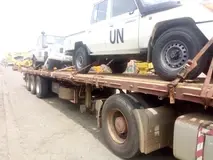
A사 아프리카 지원사업
This case study examines the annual corporate aid project conducted from 2018 to 2022, focusing on shipping used cargo trucks and other items from Busan, Korea to Bangui, Central African Republic (CAR), via Douala, Cameroon. The project's main goal is to deliver donations, including 10 used cargo trucks and various other items, to Bangui, CAR.
Introduction & outline
The project faced several challenges:
Delay in Shipping Schedule: Multiple transshipments often disrupted the schedules.
Changes in Customs & Government Policies: Frequent requirement of additional documents or processes.
Political Uncertainty: Elections and political events causing significant delays.
Political Turmoil: Situations like civil wars led to border closures.
Economic Challenges: Worsening economic situations affecting oil supply.
Additional Costs & Procedures: Imposed by national agencies, separate from regular regulations.
Challenges
Planning & Analysis
Coordinating customs registration and ECTN applications.
Handling the exemption process and related documentation.
Implementing GPS tracking on prime movers for security and monitoring.
Facilitating the inclusion in UN convoys for safe passage.
Developing contingency plans for delays and arranging additional storage if needed.

Documents in need
The following documents were essential for the shipping process, along with their respective issuing authorities:
MBL (Master Bill of Lading): Issued by the shipping line.
Commercial Invoice: Provided by the shipper.
Packing List: Prepared by the shipper.
COO (Certificate of Origin): If available, issued by the chamber of commerce or a similar authority.
ECTN (Electronic Cargo Tracking Note): Issued by an authorized CTN agency.
Exemption Letter: Issued by the government of CAR.
Power of Attorney: Signed by the consignee.
Take aways
The project's success was largely attributed to the proactive and collaborative efforts of the local agent in Cameroon and the project team.
By staying updated with the ever-changing customs and government policies, monitoring the political situation, and having robust contingency plans, the team ensured the timely and safe delivery of donations. The case highlights the importance of flexibility, local expertise, and strategic planning in managing international aid shipments in challenging environments.
This case study serves as an insightful example for similar future projects, emphasizing the significance of having knowledgeable local partners and comprehensive planning in place to navigate the complexities of international aid shipping.
In partnership with UN-Habitat, our project facilitates aid to Central Africa, handling duty exemptions, border clearance, insurance, and UN convoy arrangements in war-risk areas.
Other issues that might interest you.
Chemical Disposal Process
Expertly tackled false BOM issue, maintaining compliance, quality control, tariff refund, and smooth disposal for a client's chemical import from China. Count on us for seamless logistics.
Aid Project to Africa
In partnership with UN-Habitat, our project facilitates aid to Central Africa, handling duty exemptions, border clearance, insurance, and UN convoy arrangements in war-risk areas.
Overseas Plant Project
Initiated a project to manage overseas construction material transportation, focusing on compliance, risk management, and efficient route planning, culminating in successful delivery.
Classification & Valution
We guided in review of their Chemical Goods pricing, ensuring and complied with inter-company transaction standards, backed by comprehensive documentation and analysis.
Duty & customs refund
"We assisted I Co. in their Korean Customs process, ensuring fair pricing and compliance for duty exemptions and refunds for importing chemical materials for "ABC"
CIDB Malaysia Certification
"Our team adeptly navigated CIDB's complex processes for K Co.'s steel imports, including direct engagement with CIDB offices, ensuring compliance and smooth project execution in Malaysia."












.jpg)